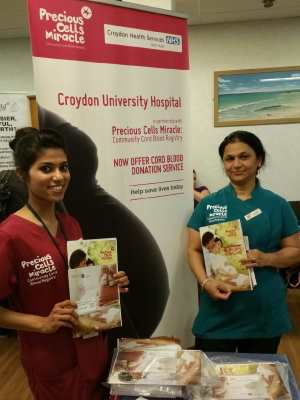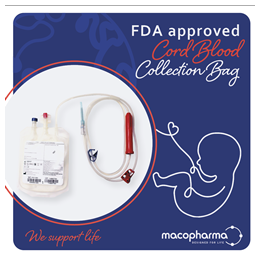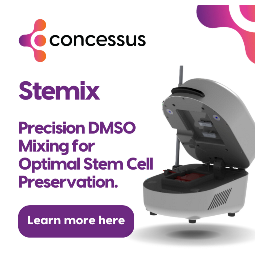Jste zde
NHS partners with Precious Cells Miracle to expand parent access to cord blood banking options

Stem cell therapy has the ability to revolutionise how we treat debilitating and life threatening illnesses. Despite the potency and potential of stem cells in cord blood, millions of litres of cord blood are discarded in the UK on a daily basis. This happens due to under resourced hospitals and low levels of awareness amongst healthcare professionals and parents-to-be. Wasting this resource has had a significant impact on the development of stem cell therapies in the UK and consequently the number of lives that can be saved.
For too long the UK has lagged behind the rest of Europe in cord blood stem cell collection and the development of stem cell technologies. The UK Stem Cell Strategic Forum recently advised the NHS that the UK requires a public inventory of at least 50,000 cord blood units in order to treat those suffering from illnesses including blood cancer, sickle cell anaemia and thalassemia. If this target were met it is estimated that 80% of patients could find a donor match on the registry. In a country where 400 people each year miss out on treatment because of a lack of suitable donors, it is imperative that this serious issue be addressed, and these lives saved.
Patient choice is at the heart of the Precious Cells Group (PCG) ethos. In September 2014, PCG established the pioneering charity Precious Cells Miracle: Community Cord Blood Registry ("the Charity"), with the aim of setting up an ethnically diverse public cord blood registry.
The aspirations of the Charity are simple: to make cord blood stem cell transplants accessible to everyone who needs them and ensure that samples can be provided at zero cost to the NHS. Dr. Neil Counihan, Chief Executive Officer for the Charity, is passionate about the impact these services will have on public health. He is calling on the British public to back the financial efforts of the Charity and also encouraging more mothers-to-be to donate their baby's cord blood.
In order to achieve this, the Charity will partner with NHS Trust hospitals around the UK to facilitate the daily and routine collection of cord blood stem cells from mothers that choose to deliver in those hospitals. This is the first time that the NHS has partnered with a charitable organisation that offers parents-to-be the option of either donating to the public bank or storing their stem cells privately.

The Charity's first hospital partnership was with Croydon Health Services NHS Trust. The Charity provides the infrastructure, systems and processes to extract and store stem cells from mothers delivering at Croydon. The cord blood collection services do not require any financial commitment or expenditure from the Trust's own budget. In fact, the partnership demonstrates a fiscal addition to the hospital's operational budget. Additionally, because the Charity supports the hospital's obstetric care team in non-obstetric duties, midwives and doctors have more time to focus on patient care.
The Charity aims to provide education on the benefits of stem cell storage to expectant parents in antenatal classes and scientific training to healthcare professionals such as midwives and doctors, which counts towards their Continuing Professional Development.
We are also working with a growing network of local community-based GPs and medical drop-in centres in a campaign to educate the wider community about the benefits of cord donation. Since the partnership in Croydon was launched, the hospital has seen a 65% consent rate for families wanting to store (either public or private) their cord blood through the program. This rate continues to grow as awareness is raised.
Following the success of our partnership with Croydon Health Services NHS Trust, Precious Cells Miracle has now entered into partnerships with several further trusts spread across the UK. The public/private collaboration between the NHS Trust and Precious Cells Miracle illustrates the growing perception that cord blood stem cell storage is a valuable medical provision which should be offered to all expectant parents.
Every day the restorative power of stem cells leads to further profound medical developments, yet in 2013 about 688,000 cord blood units were discarded in maternity wards across England and Wales. This, combined with the fact that only a handful of NHS Trusts currently have the facilities to offer stem cell donation, demonstrates an urgent need to put the facilities in place to build a strong, viable public stem cell network. Our partnerships with NHS Trusts make a strong contribution to this process. These advances not only validate Precious Cells Group as leader in its field, but will significantly contribute to the national target of 50,000 cord blood donations for the public.



 Dr. Husein K. Salem is a molecular biologist who has published research on the development of gene therapy and stem cell therapy solutions for cardiovascular, renal, and neurological disorders. He is also a serial high tech entrepreneur who is the Founder and Group CEO of
Dr. Husein K. Salem is a molecular biologist who has published research on the development of gene therapy and stem cell therapy solutions for cardiovascular, renal, and neurological disorders. He is also a serial high tech entrepreneur who is the Founder and Group CEO of